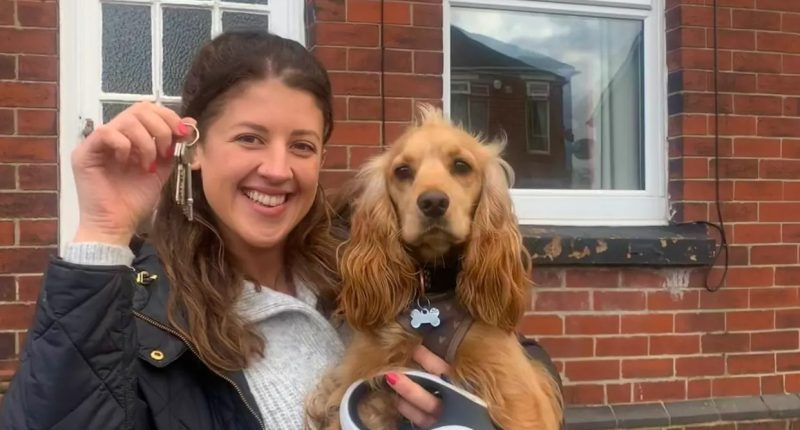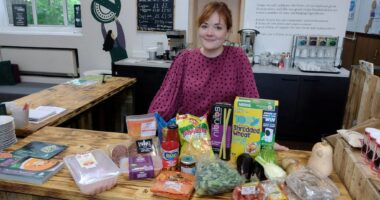IT’S tough buying your first home, especially if you are doing it all on your own.
But Sophie Leigh, 27, managed to buy her £152,000 first home in Sheffield all by herself thanks to some savvy savings and an “epic” government scheme.
Before buying her first home, Sophie had been trying to find a place she could call home after renting and moving house at least once every year since she was 18.
Getting a deposit together is often the biggest challenge on the journey to owning a home.
Usually, buyers need to come up with 10% of the property value and take a mortgage out on the rest.
Luckily, Sophie was able to maximise her savings by opening a Lifetime ISA (LISA).
Read more money stories
A LISA is a savings account that anyone aged between 18 and 40 can open to save for buying a first home or for their retirement.
You can put in a maximum of £4,000 a year until you’re 50, and the government adds an additional 25% bonus onto what you put in.
The government scheme allowed Sophie to save up the £15,200 deposit she needed to buy her £152,000 first home in Sheffield.
Sophie opened the account in 2019 and saved £12,200 in there over four years. She also bagged a bonus of £3,000.
Most read in Money
She put away £300 a month to boost her savings by cutting down her social expenses like going out for meals and nights out.
Without the LISA, which Sophie describes as “epic”, she said she wouldn’t have been able to get on the property ladder.
Sophie got the keys to her new home in February 2024, but she’s waiting to move in while renovations are carried out to the property.
She’s already put aside £10,000 for renovation works, including rewiring and new central heating.
We sat down with Sophie to discuss how she went from being a saver to homeowner for The Sun’s My First Home series.
Tell me about your house
My home is a two-bedroom terraced house in Sheffield.
There is a good-sized bathroom downstairs and two double-sized bedrooms.
The property has a lovely garden which was really important for me as I wanted to have a space for my dog, Stella, to run around.
The property is quite old, it was built in 1910 so it will need quite a bit of work done to it before it’s livable.
I want to redo the bathroom and the kitchen, as well as replace some of the furnishings.
Plus, the whole property needs rewiring and central heating installed.
I knew it was a really good space when I saw it, so I wasn’t concerned about getting a doer-upper.
I’m so glad I took the leap and I’m ready to take on the work.
How did you decide on the location?
I initially found the property on Zoopla.
I’m from Sheffield so I knew that the area I was moving to has a good reputation.
It’s also close to one of the city’s biggest parks so I can take my dog, Stella, on long walks.
I’ve been renting for eight years and have moved every year, so it was great to finally have a place to call my own that was still near my family.
How much was it?
I put my first offer in September 2023, initially at £145,000 but that was rejected.
I knew that I didn’t want to lose the house, so I decided to put in an offer for the listed price of £152,000, which was accepted.
I took out a mortgage of £136,800 over 30 years at a fixed rate of 5.44% for two years.
My repayments are £750 a month.
When I initially started looking rates were at 6% but they had fallen slightly by the time I started looking.
My bank told me that this would save me around £200 a month.
How to get the best deal on your mortgage
IF you’re looking for a traditional type of mortgage, getting the best rates depends entirely on what’s available at any given time.
There are several ways to land the best deal.
Usually the larger the deposit you have the lower the rate you can get.
If you’re remortgaging and your loan-to-value ratio (LTV) has changed, you’ll get access to better rates than before.
Your LTV will go down if your outstanding mortgage is lower and/or your home’s value is higher.
A change to your credit score or a better salary could also help you access better rates.
And if you’re nearing the end of a fixed deal soon it’s worth looking for new deals now.
You can lock in current deals sometimes up to six months before your current deal ends.
Leaving a fixed deal early will usually come with an early exit fee, so you want to avoid this extra cost.
But depending on the cost and how much you could save by switching versus sticking, it could be worth paying to leave the deal – but compare the costs first.
To find the best deal use a mortgage comparison tool to see what’s available.
You can also go to a mortgage broker who can compare a much larger range of deals for you.
Some will charge an extra fee but there are plenty who give advice for free and get paid only on commission from the lender.
You’ll also need to factor in fees for the mortgage, though some have no fees at all.
You can add the fee – sometimes more than £1,000 – to the cost of the mortgage, but be aware that means you’ll pay interest on it and so will cost more in the long term.
You can use a mortgage calculator to see how much you could borrow.
Remember you’ll have to pass the lender’s strict eligibility criteria too, which will include affordability checks and looking at your credit file.
You may also need to provide documents such as utility bills, proof of benefits, your last three month’s payslips, passports and bank statements.
How did you save for it?
I’ve always been pretty savvy with my money, but I would say the pandemic was what really kickstarted my savings.
I opened a Lifetime Isa, which my mum encouraged me to do.
In 2022, I was working full-time in marketing and my outgoings were around £1,000 a month including rent.
The following year, I moved in with my grandparents. This meant my outgoings dropped to £315, which made a huge difference.
The only things I was paying for were food (£80), my gym membership (£35) and petrol for my car (£200).
It’s not possible for everyone but I’m fortunate to have family to rely on and understand that I’m very lucky.
Because of the pandemic restrictions, I wasn’t spending as much money on going out and shopping.
I swapped out meals and drinks for picnics and dog walks.
I spent a lot of time with my family at home and switched to home cooking instead of eating out with friends.
This allowed me to focus on my savings and put away £300 a month into my Lifetime ISA, which I had with Moneybox.
It’s an epic scheme and really fast-tracked my savings.
When the pandemic ended, I continued this habit and kept putting away £300 a month for three and a half years, until I bought my house.
By the time I came to buy I had saved £12,200 into the account and got a bonus of £3,000 from the government.
I made sure my credit score was good before I put in the offer by always making my payments on time.
I’ve only ever had credit cards which I always pay off every month and I’ve never had any debts – I hate owing people money.
How did you afford to furnish it?
As well as helping me save for my deposit, living rent-free with my grandparents also allowed me to save up for renovations.
The property is completely unfurnished and it does need some structural work done.
It needs a full renovation including re-wiring, a new boiler and a new front door, before I can even think about moving in.
I’m hoping to have all of the renovations completed by July, but there is a lot to do I’m hoping friends can help me out.
I’ve saved up £6,000 so far, but as I am still living with my grandparents, I will keep saving up.
I’m continuing with the same habits I used to save for my deposit to get the cash together.
I have some of my own furnishings from previous properties like beds, a fridge freezer and small furniture like bedside tables and drawers.
I will also need to spend some money on finishing touches like soft furnishings and kitchen crockery.
I hope to keep those costs under £500, by shopping savvy, looking for deals and buying second-hand where possible.
Do you have any advice for other first-time buyers?
I think homeownership is more attainable than I first thought thought, it just requires a lot of sacrifices.
But renting is just paying someone else’s mortgage so you might as well get a place yourself.
I knew I wanted to own my own place after almost nine years of renting so I made it my priority and it’s now become a reality.
I have a few friends and a cousin who are also in the process and it definitely helps having others to chat through the process with.
I definitely recommend getting a Lifetime ISA.
If I didn’t have one, I wouldn’t have had the money to buy my property and would have missed my dream home.
READ MORE SUN STORIES
My next hurdle will be finding the right people for each renovation job.
One woman has shared how she was able to save £16,000 for her deposit with a “last digit savings” trick.
What help is out there for first-time buyers?
GETTING on the property ladder can feel like a daunting task but there are schemes out there to help first-time buyers have their own home.
Help to Buy Isa – It’s a tax-free savings account where for every £200 you save, the Government will add an extra £50. But there’s a maximum limit of £3,000 which is paid to your solicitor when you move. These accounts have now closed to new applicants but those who already hold one have until November 2029 to use it.
Help to Buy equity loan – The Government will lend you up to 20% of the home’s value – or 40% in London – after you’ve put down a 5% deposit. The loan is on top of a normal mortgage but it can only be used to buy a new build property.
Lifetime Isa – This is another Government scheme that gives anyone aged 18 to 39 the chance to save tax-free and get a bonus of up to £32,000 towards their first home. You can save up to £4,000 a year and the Government will add 25% on top.
Shared ownership – Co-owning with a housing association means you can buy a part of the property and pay rent on the remaining amount. You can buy anything from 25% to 75% of the property but you’re restricted to specific ones.
Mortgage guarantee scheme – The scheme opens to new 95% mortgages from April 19 2021. Applicants can buy their first home with a 5% deposit, it’s eligible for homes up to £600,000.
Do you have a money problem that needs sorting? Get in touch by emailing [email protected].
Plus, you can join our Sun Money Chats and Tips Facebook group to share your tips and stories.













